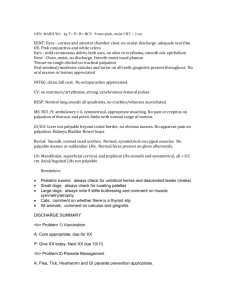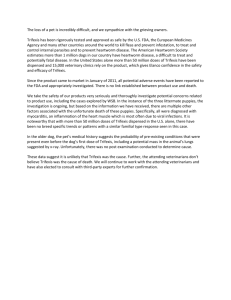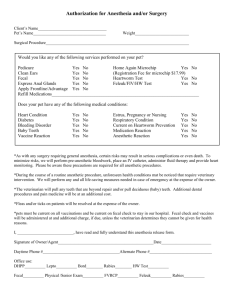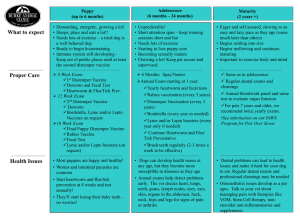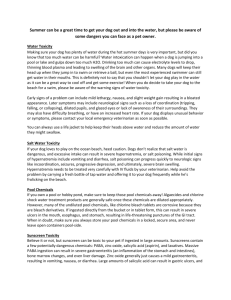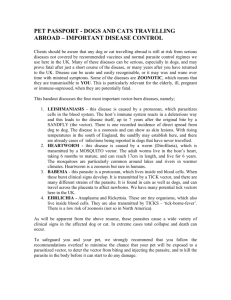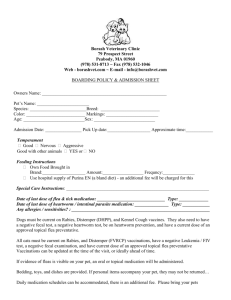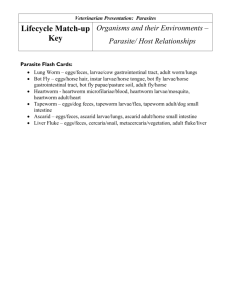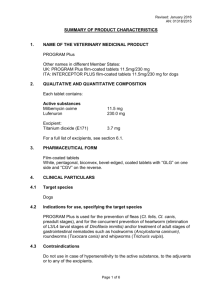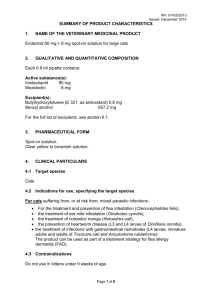Annual Health Report
advertisement
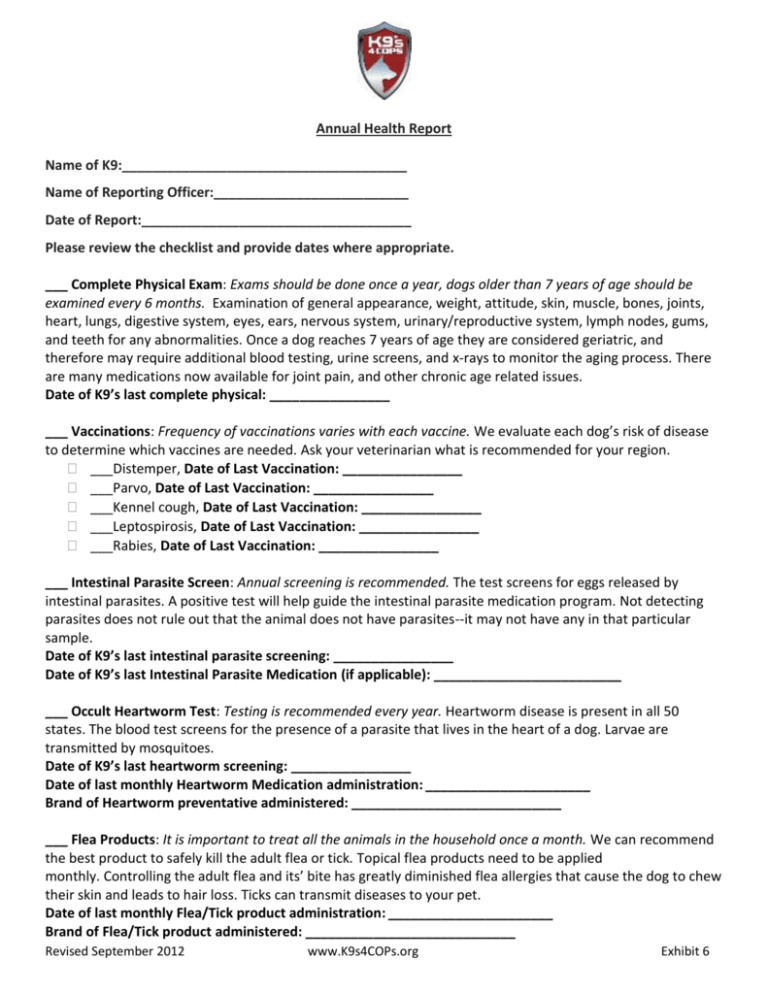
Annual Health Report Name of K9:______________________________________ Name of Reporting Officer:__________________________ Date of Report:____________________________________ Please review the checklist and provide dates where appropriate. ___ Complete Physical Exam: Exams should be done once a year, dogs older than 7 years of age should be examined every 6 months. Examination of general appearance, weight, attitude, skin, muscle, bones, joints, heart, lungs, digestive system, eyes, ears, nervous system, urinary/reproductive system, lymph nodes, gums, and teeth for any abnormalities. Once a dog reaches 7 years of age they are considered geriatric, and therefore may require additional blood testing, urine screens, and x-rays to monitor the aging process. There are many medications now available for joint pain, and other chronic age related issues. Date of K9’s last complete physical: ________________ ___ Vaccinations: Frequency of vaccinations varies with each vaccine. We evaluate each dog’s risk of disease to determine which vaccines are needed. Ask your veterinarian what is recommended for your region. ___Distemper, Date of Last Vaccination: ________________ ___Parvo, Date of Last Vaccination: ________________ ___Kennel cough, Date of Last Vaccination: ________________ ___Leptospirosis, Date of Last Vaccination: ________________ ___Rabies, Date of Last Vaccination: ________________ ___ Intestinal Parasite Screen: Annual screening is recommended. The test screens for eggs released by intestinal parasites. A positive test will help guide the intestinal parasite medication program. Not detecting parasites does not rule out that the animal does not have parasites--it may not have any in that particular sample. Date of K9’s last intestinal parasite screening: ________________ Date of K9’s last Intestinal Parasite Medication (if applicable): _________________________ ___ Occult Heartworm Test: Testing is recommended every year. Heartworm disease is present in all 50 states. The blood test screens for the presence of a parasite that lives in the heart of a dog. Larvae are transmitted by mosquitoes. Date of K9’s last heartworm screening: ________________ Date of last monthly Heartworm Medication administration: ______________________ Brand of Heartworm preventative administered: ____________________________ ___ Flea Products: It is important to treat all the animals in the household once a month. We can recommend the best product to safely kill the adult flea or tick. Topical flea products need to be applied monthly. Controlling the adult flea and its’ bite has greatly diminished flea allergies that cause the dog to chew their skin and leads to hair loss. Ticks can transmit diseases to your pet. Date of last monthly Flea/Tick product administration: ______________________ Brand of Flea/Tick product administered: ____________________________ Revised September 2012 www.K9s4COPs.org Exhibit 6 ___ Blood Profile: Blood profiles should be performed as recommended by your veterinarian. After a dog reaches 7 years of age, we recommend running blood profiles every 12 months. It is also recommended prior to anesthesia. Detection of health problems early allows for management of some diseases. Lab tests detect anemia, dehydration, blood protein levels, and screens electrolytes, kidney, liver, and pancreas. Date of K9’s last blood profile: ________________ ___ Urinalysis: Urinalysis should be done every 12 months depending on age, medications or disease condition. It evaluates kidney function and also aids in the detection of crystals in the urine, bladder infection, bladder stones, bladder cancer, diabetes and other systemic diseases. Date of K9’s last urinalysis: ________________ ___ Dental Services: Regular professional cleaning of the teeth under anesthesia helps promote a healthy mouth. Dental exams may reveal tartar buildup resulting in gum disease, fractured teeth, retained baby teeth or mouth infections. At home, brushing teeth, chewing flat rawhide chews or Prescription Diet T/D will help with dental care. Date of K9’s last dental cleaning: ________________ ___ Diet: Feeding a high quality name brand diet is recommended, and supplementing diet with joint supplements such as Glucosamine Chondroitin, Omega 3 fatty acids, etc. is generally beneficial for long term joint health. Ask your veterinarian for recommendations. Service dogs (German Shepherds, Belgian Malinois, etc) are predisposed to Gastric Dilitation Volvulus (Bloat) and therefore should be fed twice daily AFTER exercise. Feeding before work, exercise or training can predispose these breeds to bloat. ___ Exercise/General Health: Dogs should be kept at an ideal, athletic weight. Excess weight may cause increased stress on the joints and cardiovascular system, resulting in negative health issues later in life. Dogs should NEVER be left in an un-air conditioned vehicle. Revised September 2012 www.K9s4COPs.org Exhibit 6
